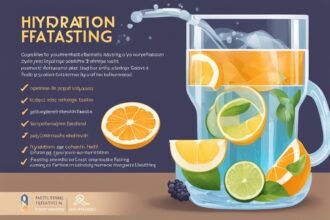Hey there, fasting enthusiasts! If you’re diving into the world of fasting to unlock its incredible health perks, there’s one crucial element you can’t overlook: hydration. While fasting benefits like improved metabolic health, weight management, and mental clarity often steal the spotlight, staying hydrated is the unsung hero that can make or break your fasting journey. Whether you’re practicing intermittent fasting, water fasting, or religious fasts, keeping your body’s water balance in check is essential for safety and effectiveness. In this deep dive, we’ll explore why hydration matters, how to do it right, and the science behind it—all while ensuring you reap the maximum fasting benefits. Let’s get started!
Why Hydration Matters During Fasting
When you fast, your body goes through significant changes. Without food intake, it shifts to burning stored energy, which can lead to dehydration if you’re not careful. Water is vital for nearly every bodily function—think temperature regulation, digestion, and toxin removal. During fasting, dehydration risks increase because you’re not getting water from food, which typically accounts for about 20% of your daily intake (Institute of Medicine, 2005). Neglecting hydration can lead to fatigue, headaches, and even dizziness, which can derail the fasting benefits you’re aiming for, like enhanced autophagy or fat loss. Staying hydrated ensures your body can handle the stress of fasting while supporting cellular repair and energy levels.
The Science Behind Hydration and Fasting Benefits
Let’s nerd out for a moment on the science. Fasting triggers a state called ketosis, where your body burns fat for fuel, producing ketones. This process can increase water loss through urine as your body depletes glycogen stores, which are bound to water molecules (Volek & Phinney, 2011). Additionally, fasting can lower insulin levels, prompting the kidneys to excrete more sodium and water (Hall, 2015). Without proper hydration, this can lead to electrolyte imbalances, reducing the health advantages of fasting like improved insulin sensitivity. Studies also suggest that adequate hydration supports cognitive function during fasting, helping you stay focused—a key mental benefit of fasting (Pross et al., 2014). So, water isn’t just a nice-to-have; it’s a must for amplifying fasting’s positive effects.
How Much Water Should You Drink While Fasting?
Now, you might be wondering, “How much water do I actually need?” The answer varies based on factors like your body weight, activity level, and the type of fast you’re doing. A general guideline from health experts is to aim for 2–3 liters (about 8–12 cups) of water per day for most adults, adjusting for fasting conditions (Mayo Clinic, 2020). If you’re on a prolonged fast, you might need more to compensate for the lack of dietary water. Listen to your body—thirst, dark urine, or dry mouth are signs you’re not drinking enough. Prioritizing hydration can enhance fasting for weight loss by reducing false hunger signals, as thirst is often mistaken for hunger.
Here are some practical benchmarks to aim for:
- Start with at least 2 liters (8 cups) daily as a baseline during fasting.
- Increase intake to 3 liters if you’re active or in a hot climate.
- Monitor urine color—pale yellow means you’re hydrated; dark yellow signals dehydration.
- Sip water consistently rather than chugging large amounts at once to avoid stomach discomfort.
Electrolytes: The Missing Piece of Hydration
Water alone isn’t always enough, especially during extended fasts. Electrolytes like sodium, potassium, and magnesium play a huge role in maintaining fluid balance, nerve function, and muscle health. When fasting, you lose these minerals through urine and sweat, which can lead to symptoms like cramps or fatigue—countering the fasting health benefits you’re chasing. Research shows that supplementing with electrolytes during fasting can prevent these issues and support energy levels (Maughan, 2003). You don’t need fancy sports drinks; simple solutions like adding a pinch of sea salt to your water or sipping on bone broth (if your fast allows) can work wonders.
Here are some easy ways to maintain electrolyte balance:
- Add 1/8 teaspoon of high-quality sea salt to a glass of water for a quick sodium boost.
- Consider a sugar-free electrolyte powder if plain water feels boring.
- Eat potassium-rich foods like avocado or spinach during eating windows to prep for fasting.
- If allowed, sip on herbal teas with natural minerals during fasting hours.
- Avoid overdoing it—too much salt can cause bloating, so balance is key.
Common Hydration Mistakes During Fasting
I’ve seen so many fasters trip up on hydration, even with the best intentions. One big mistake is waiting until you’re thirsty to drink—by then, you’re already mildly dehydrated. Another is overloading on caffeinated drinks like coffee or tea, which can act as diuretics and increase water loss, negating some intermittent fasting benefits. Also, some folks forget that overhydration is a risk too; drinking excessive water without electrolytes can dilute sodium levels, leading to a condition called hyponatremia. The trick is to find a steady rhythm—sip water throughout your fasting window and pay attention to how your body feels.
Practical Tips to Stay Hydrated and Maximize Fasting Benefits
Alright, let’s get into actionable advice to keep you hydrated and thriving during your fast. First, always have a reusable water bottle nearby—it’s a visual reminder to drink. Set a loose schedule, like drinking a glass every couple of hours, especially if you’re busy and tend to forget. If plain water bores you, infuse it with a slice of lemon or cucumber (check your fasting rules first). Timing matters too—drink more in the morning to kickstart hydration, as overnight fasting can leave you slightly dehydrated. These small habits can supercharge the fasting wellness benefits, ensuring you feel energized rather than sluggish.
Staying hydrated isn’t just about avoiding discomfort; it’s about enhancing every aspect of your fasting experience. From supporting fat-burning to maintaining mental sharpness, water is your secret weapon. As you weave these hydration strategies into your routine, you’ll likely notice how much smoother fasting feels. Whether your goal is fasting for health improvement or spiritual growth, remember that hydration is the foundation. So, grab that water bottle, take a sip, and keep pushing toward those amazing fasting benefits. You’ve got this!
References
- Hall, K. D. (2015). What is the required energy deficit per unit weight loss? International Journal of Obesity, 39(4), 573–576.
- Institute of Medicine. (2005). Dietary Reference Intakes for Water, Potassium, Sodium, Chloride, and Sulfate. National Academies Press.
- Maughan, R. J. (2003). Impact of mild dehydration on wellness and on exercise performance. European Journal of Clinical Nutrition, 57(Suppl 2), S19–S23.
- Mayo Clinic. (2020). Water: How much should you drink every day? Retrieved from Mayo Clinic website.
- Pross, N., et al. (2014). Effects of changes in water intake on mood of high and low drinkers. PLoS ONE, 9(4), e94754.
- Volek, J. S., & Phinney, S. D. (2011). The Art and Science of Low Carbohydrate Living. Beyond Obesity LLC.






